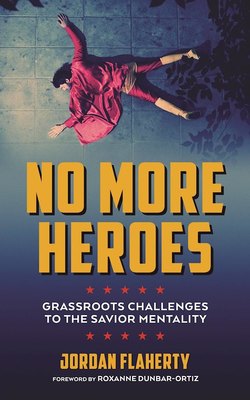Читать книгу No More Heroes - Jordan Flaherty - Страница 4
На сайте Литреса книга снята с продажи.
Introduction
ОглавлениеIt was a beautiful spring evening in New Orleans when I ran into Brandon Darby at a café in the Marigny neighborhood. After a quick hello, he lowered his voice. “Have you seen the news today?”1
“What do you mean?”
Darby was an activist who carried himself with an air of self-importance and liked to brag about his guns and plans for revolution. He often started conversations with questions like this, delivered with a mysterious and urgent air. But this sounded more serious than usual.
“It’s Riad. He’s dead.” He gave an awkward, nervous smile. “I feel kind of bad about it.”
I was speechless. Darby went on to tell me that the body of my friend Riad Hamad had been found with his hands and feet bound, floating in a lake. He voiced what sounded like a conspiracy theory, telling me he thought perhaps the government had killed Riad. Less than two years later, Darby would publicly announce his role as an FBI informant who had conspired to imprison Riad and others.
When I think about that night and about Riad’s strange and sudden death, I still feel pain and grief. In looking for answers, I return to unanswered questions about the role of Darby in Riad’s death. Then I turn inward, looking at my own responsibility in not speaking up as Darby rose to his positions of power and influence in my community.
Darby had a magnetic charm, and social movements have an unfortunate history of following the leadership of charismatic hero figures. I’ve come to think of this as the savior mentality, the idea that a hero will come and answer our societal problems, like Superman saving Lois Lane or a firefighter rescuing a kitten from a tree. It’s a simplistic view of change, taught by religion, popular culture, and our school system.
The idea of a heroic rescue is compelling to me as well, and I’ve made many mistakes in my attempts to do good over the years. Too often I was one of those who saw and said too little, or who took action without looking into what the long-term effects were likely to be.
Over years of working as a journalist, I have encountered this savior mentality repeatedly. From New Orleans to Phoenix to Anchorage to Gaza, I have seen pain caused by those who say they are coming to help. As I discuss in the coming pages, I have seen idealistic young activists pulled into campaigns on behalf of “saving” sex workers through policing. I’ve seen them plan international “voluntourism” trips and consider joining Teach For America; all in the name of rescuing those less-fortunate than themselves.
I have also spent time observing and participating in popular uprisings—from Tahrir Square in Egypt to Occupy Wall Street to the Movement for Black Lives—that have consciously challenged this dynamic. I have learned from the people most affected by so-called saviors: the people with the least privilege, who resisted easy solutions and have built grassroots, accountable movements focused on systemic change. From these front lines of social justice struggles, I have learned firsthand the importance of systemic solutions to the problems we face.
I am indebted to the people on the frontlines of these movements, who have seen saviors claim to help them as they make things worse. The best analysis of saviors comes from those who have been on the receiving end of their rescues, and my goal here is to amplify their voices. I believe that with the privileged position I was born into, it is important to speak up against white supremacy, patriarchy, and other systems that uphold the advantages I have as a white, cisgender male. My purpose in writing this book is not to supplant the voices of those with less privilege, but to create a tool and resource for all of us to challenge these systems and stand together with already existing movements to create a better world.
